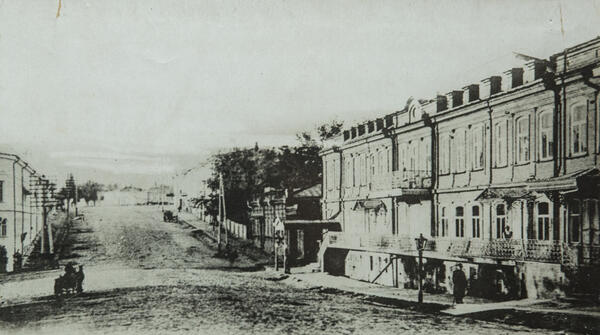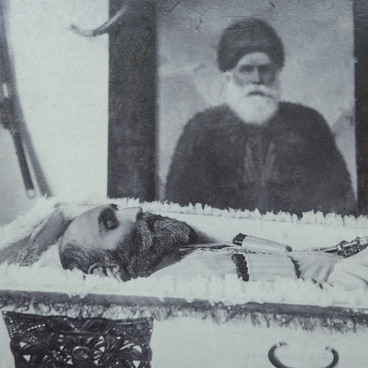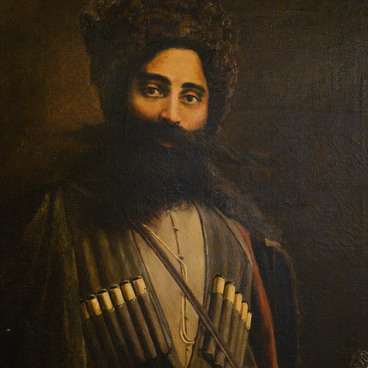On Stavropol’s central avenue, there is a modest obelisk dedicated to Kosta Khetagurov. In this city, where he spent more than fifteen years of his life, he was formed as a person and as an artist.
In the winter of 1891, the authorities decided to close the Olginsky Ossetian Girls' School in Vladikavkaz, even though it was a popular educational institution. Khetagurov and other concerned residents of the city actively protested against this decision, signed a petition, and the school was defended. However, the authorities subjected everyone who signed the document to various punishments. In particular, Khetagurov was sent outside the Vladikavkaz district for five years.
In June, Kosta Levanovich went to his father to the village Georgiyevsko-Osetinskoye (Laba) and got a job as a clerk at a silver-lead mine in upper Kuban. He interacted closely with workers and residents of the surrounding villages and was a frequent guest at their holidays and family celebrations. Many of these countrymen later became prototypes for his literary heroes.
At the beginning of 1892, Levan Khetagurov, the poet’s father, died. He bitterly recalled: ‘The death of my father finally shook my nerves… I felt completely alone in the whole wide world…’ Kosta Levanovich decided to leave his father’s house; in the winter of 1893, he received a payment from the office and in mid-February left for Stavropol.
He rented a furnished room in a busy part of the city, and in the fall moved to the estate of his art teacher Vasily Smirnov on Alexandrovskaya Street (today called Dzerzhinskiy Street). Smirnov’s eldest daughter Galina recalled: ‘Kosta settled in our house and became like a real member of our family’.
In Stavropol, Khetagurov revealed himself as an outstanding publicist and an active public figure. He constantly participated in city events, concerts and musical evenings, and organized literary readings. The poet worked in the private liberal newspaper ‘North Caucasus’, on the pages of which he wrote about pressing social issues, and published diatribes and feuilletons. In December of 1895, the first collection of his poems in Russian was published as an attachment to the newspaper.
In the winter of 1891, the authorities decided to close the Olginsky Ossetian Girls' School in Vladikavkaz, even though it was a popular educational institution. Khetagurov and other concerned residents of the city actively protested against this decision, signed a petition, and the school was defended. However, the authorities subjected everyone who signed the document to various punishments. In particular, Khetagurov was sent outside the Vladikavkaz district for five years.
In June, Kosta Levanovich went to his father to the village Georgiyevsko-Osetinskoye (Laba) and got a job as a clerk at a silver-lead mine in upper Kuban. He interacted closely with workers and residents of the surrounding villages and was a frequent guest at their holidays and family celebrations. Many of these countrymen later became prototypes for his literary heroes.
At the beginning of 1892, Levan Khetagurov, the poet’s father, died. He bitterly recalled: ‘The death of my father finally shook my nerves… I felt completely alone in the whole wide world…’ Kosta Levanovich decided to leave his father’s house; in the winter of 1893, he received a payment from the office and in mid-February left for Stavropol.
He rented a furnished room in a busy part of the city, and in the fall moved to the estate of his art teacher Vasily Smirnov on Alexandrovskaya Street (today called Dzerzhinskiy Street). Smirnov’s eldest daughter Galina recalled: ‘Kosta settled in our house and became like a real member of our family’.
In Stavropol, Khetagurov revealed himself as an outstanding publicist and an active public figure. He constantly participated in city events, concerts and musical evenings, and organized literary readings. The poet worked in the private liberal newspaper ‘North Caucasus’, on the pages of which he wrote about pressing social issues, and published diatribes and feuilletons. In December of 1895, the first collection of his poems in Russian was published as an attachment to the newspaper.



